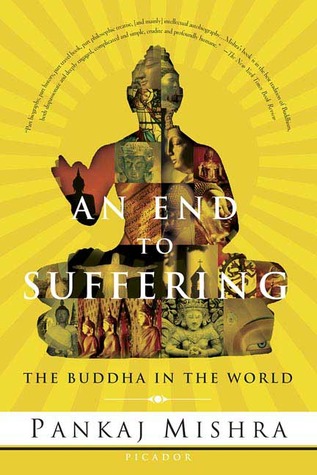by Rose Parker
At moments, An End to Suffering: The Buddha in the World by seems to be two books disguised as one. The main thread of the narrative follows the development of Buddhism, with an eye to interactions between East and West. Another thread reveals Pankaj Mishra’s coming of age as a writer and as a person.
He starts as a young student enamored of Western philosophers, of “science and progress,” and mildly contemptuous of ‘outdated’ ways of thinking (e.g., Indian philosophy and religion, the small-town worldview/mannerisms of his father). Even as a young person, Mishra has an interest in Buddhism that he himself does not understand. Reflecting on that time in his life, he thinks it odd “that someone like myself, who knew so little of the world, and who longed, in one secret but tumultuous corner of his heart, for love, fame, travel, adventures in far-off lands, should also have been thinking of a figure [the Buddha] who stood in such contrast to these desires.”
Separate themes – the history of Buddhism and Mishra’s life as a writer – tangle together. Over the years Mishra’s relationship with the Buddha develops and transforms. As he delves into studying the history of Buddhism, Mishra lays out clear explanations of basic Buddhist teachings and concepts. Over time, he grows to see Buddhist ideas like the impermanence/illusory nature of the self not as relics of the ancient past, but as fresh and relevant to his own experience.
Mishra’s friendly and conversational tone makes a tour of ancient history feel as dramatic and real as the best of a grandparent’s stories, teaching us how the past continues to mark our lives today. Masterful storytelling connects the history of Buddhism to his own personal experience, and to an India coping with the psychological wounds of colonization, and the loss of identity that so many feel in a rapidly changing world. Though the author’s digressions might occasionally allow readers to drift off into their own thoughts, this rambling style allows for leisurely excursions into fascinating, unexpected subjects and poignant anecdotes that, in the end, tie back to the central ideas.
This is a story about a writer, about India’s relationship with the world, and about the Buddha. It speaks to much more than one person or group’s experience. It is about finding strength and identity in times of turmoil. Deep, loving self-awareness and other tools of Buddhism give Mishra a way forward and a “path to the end of suffering.” The same tools are at the fingertips of readers looking for their own way forward.
********************
Thank you, Rose!
Rose Parker is a freelance writer based in Southern California.

